- Home
- Gillian Flynn
The Grownup Page 3
The Grownup Read online
Page 3
Six weeks in, and I was boiling my lavender in the kitchen one morning—Susan off to work, the kids at school—when I felt a presence behind me. I turned to find Miles in his school uniform, examining me, a small smirk on his face. He was holding my copy of The Turn of the Screw.
“You like ghost stories?” He smiled.
He’d been through my purse.
“Why are you at home, Miles?”
“I’ve been studying you. You’re interesting. You know something bad is going to happen, right? I’m curious.”
He moved closer, I moved away. He stood next to the pot of boiling water. His cheeks flushed from the heat.
“I’m trying to help, Miles.”
“But you agree? You feel it? Evil?”
“I feel it.”
He stared into the pot of water. Traced a finger on its edge, then snatched the finger away, pink. He assessed me with his shining black spider eyes.
“You don’t look how I thought you’d look. Up close. I thought you’d be…sexy.” He said the word ironically, and I knew what he meant: Halloween fortune-teller sexy. Lip gloss and big hair and hoop earrings. “You look like a babysitter.”
I stepped farther back from him. He hurt the last babysitter.
“Are you trying to scare me, Miles?”
I wished I could reach the stove, turn off the burner.
“I’m trying to help you,” he said reasonably. “I don’t want you around her. If you come back, you will die. I don’t want to say more than that. But I’ve warned you.”
He turned away and left the room. When I heard him hit the front stairs, I poured the scalding water down the drain, then ran to the dining room to grab my purse, my keys. I needed to leave. When I picked up my purse, a foul, sweet heat hit my nostrils. He’d vomited inside—all over my keys and wallet and phone. I couldn’t bear to pick up the keys, touch that sickness.
Susan banged through the door, frantic.
“Is he here? Are you OK?” she said. “School called, said Miles never showed. He must have walked in the front door and straight out the back. He doesn’t like it that you’re here. Did he say anything to you?”
A loud smash came from upstairs. A wail. We ran up the stairs. In the hallway, hanging from a ceiling hook, was a tiny, primitive figure made of cloth. A face drawn in magic marker. A noose made from red thread. Screaming came from Miles’s room at the end of the hall. Nonoooooooo, you bitch, you bitch!
We stood outside the door.
“Do you want to talk to him?” I asked.
“No,” she said.
She turned back down the hall in tears. Plucked the figure from the light fixture.
“I thought this was me at first,” Susan said, handing it to me. “But I don’t have brown hair.”
“I think it’s me,” I said.
“I’m so tired of being afraid,” she murmured.
“I know.”
“You don’t,” she said. “But you will.”
Susan went to her room. I went to work. I swear I worked. I washed the house—every inch of wall and floor—with rosemary and lavender. I smudged the sage and said my magical words that were gibberish as Miles screamed and Susan cried in the rooms above me. Then I dumped everything from my vomit-smeared purse into the kitchen sink and ran water over it until it was clean.
As I was unlocking my car in the dusk, an older woman, well powdered and plump-cheeked, called out to me from down the block. She scurried over in the mist, a little smile on her face.
“I just want to thank you for what you are doing for this family,” she said. “For helping little Miles. Thank you.” And then she put her fingers to her lips and pantomimed locking them, and scurried away again before I could tell her I was doing absolutely nothing to help this family.
A week later, as I was killing time in my tiny apartment (one bedroom, fourteen books), I noticed something new. A stain, like a rusty tidal pool on the wall by my bed. It reminded me of my mother. Of my old life. All the transactions—this for that, that for this—and none of it had made any difference until now. Once the transaction was complete, my mind was a blank, awaiting the next transaction. But Susan Burke and her family, they stuck with me. Susan Burke and her family and that house.
I opened up my ancient laptop and did a search: Patrick Carterhook. A whir and a grind and finally up came a link to an article from a university English Department: Victorian True Crime: The Grisly Tale of the Patrick Carterhook Family.
The year is 1893, and department-store magnate Patrick Carterhook moves into his splendid Gilded Age mansion in the heart of the city with his lovely wife, Margaret, and their two sons, Robert and Chester. Robert was a troubled boy, much given to bullying schoolmates and harming neighborhood pets. At age twelve, he burnt down one of his father’s warehouses and remained on scene to watch the wreckage. He endlessly tormented his quiet younger brother. By age fourteen, Robert proved unable to control himself. The Carterhooks chose to keep him away from society: In 1895 they locked him inside the mansion. He was never again to set foot outdoors. Robert steadily grew more violent in his gloomy, gilded prison. He smeared his family’s belongings with his own excrement and vomit. A nursemaid was sent to the hospital with unexplained bruises; she never returned. The cook, too, fled one winter morning. Rumors had it that she’d suffered third-degree burns from boiling water in a “kitchen mishap.”
No one knows exactly what went on in that house the night of January 7, 1897, but the bloody results are indisputable. Patrick Carterhook was discovered stabbed to death in his bed; his body was pocked with 117 knife wounds. Patrick’s wife, Margaret, was found struck down by an ax—still in her back—as she was fleeing up the stairs to the attic, and young Chester, age ten, was found drowned in a bathtub. Robert hanged himself from a beam in his room. He had apparently dressed up for the occasion: he wore a blue Sunday suit, covered in his parents’ blood. It was still wet from drowning his little brother.
Beneath the story was a blurry ancient photo of the Carterhooks. Four formal unsmiling faces peering out from layers of Victorian ruffles. A slender man in his forties with an artfully pointed beard; a blond, petite woman with sad, piercing eyes so light they looked white. Two boys, the younger blond like his mother; the elder dark-haired, black-eyed with a slight smirk and his head tilted at a knowing angle. Miles. The elder boy looked like Miles. Not a perfect match, but the essence was exact: the smugness, the superiority, the threat.
Miles.
If you remove the bloody floorboards and water-stained tiles; if you destroy the beams that held Robert Carterhook’s body, and you tear down the walls that absorbed the screams, do you take down the house? Can it be haunted if the actual guts—its internal organs—have been removed? Or does the nastiness linger in the air? That night I dreamt of a small figure opening the door to Susan’s room, creeping across the floor as she slept, and standing calmly over her with a gleaming butcher knife borrowed from her million-dollar kitchen. The room smelled of sage and lavender.
I slept into the afternoon and woke in the darkness, in the middle of a thunderstorm. I stared at the ceiling until the sun set, then got dressed and drove over to Carterhook Manor. I left my useless herbs behind.
Susan opened the door with wet eyes. Her pale faced glowed from the gloom of the house.
“You are psychic,” she whispered. “I was going to call you. It’s gotten worse, it’s not stopping,” she said. She collapsed onto a sofa.
“Are Miles and Jack here?”
She nodded and pointed a finger up. “Miles told me last night, quite calmly, that he was going to kill us,” she said. “And I actually worry…because…Wilkie…” She was crying again. “Oh, God.”
A cat padded slowly into the room. Ribby and worn, an old tomcat. Susan pointed to it.
“Look what he did…to poor Wilkie!”
I looked again. At the cat’s back haunches was only a frayed tuft of fur. Miles had cut off the cat’s tail.
�
��Susan, do you have a laptop? I need to show you something.”
She led me up to the library, and over to the Victorian desk that was clearly her husband’s. She clicked a switch and the fireplace whooshed on. She hit a key and the laptop glowed. I showed Susan the website and the story of the Carterhooks. I could feel her warm breath on my neck as she read.
I pointed at the photo: “Does Robert Carterhook remind you of anyone?”
Susan nodded as if in a trance. “What does it mean?”
The rain spattered at the black windowpanes. I longed for a bright blue day. The heaviness of the house was unbearable.
“Susan, I like you. I don’t like many people. I want the best for your family. And I don’t think it’s me.”
“What do you mean?”
“I mean, you need someone to help you. I can’t help. There is something wrong with this house. I think you should leave. I don’t care what your husband says.”
“But if we leave…Miles is still with us.”
“Yes.”
“Then…he’ll be cured? If he leaves this house?”
“Susan, I don’t know.”
“What are you saying?”
“I’m saying you need more than me to fix this. I’m not qualified. I can’t fix it. I think you need to leave tonight. Go to a hotel. Two rooms. Lock the adjoining door. And then…we’ll figure it out. But all I can really do for you is be your friend.”
Susan stood dizzily, holding her throat. She pushed back from me, murmured excuse me, and disappeared out the door. I waited. My wrist was throbbing again. I glanced around the book-filled room. No parties here for me. No referrals to rich, nervous friends. I was ruining my big chance; I gave her an answer she didn’t want. But I felt, for once, decent. Not telling-myself-I-am decent, but just decent.
I saw Susan flicker past the door heading down the stairs. Then Miles swooped immediately after her.
“Susan!” I yelled. I stood up but I couldn’t will myself to go outside the room. I heard murmuring. Urgent or angry. Then nothing. Silence. And still nothing. Go out there. But I was too afraid to go alone into that dark hallway.
“Susan!”
A child who terrorized his little brother and threatened his stepmom. Who told me calmly that I would die. A kid who cut the tail off the family pet. A house that attacked and manipulated its own inhabitants. A house that had already seen four deaths and wanted more. Stay calm. The hallway was still dark. No sign of Susan. I stood. I began walking to the door.
Miles suddenly appeared in the doorway, stiff and upright, in his school uniform, as always. He was blocking my exit.
“I told you not to ever come back here, and you came back—you came back again and again,” he said. Reasonable. Like he was talking to a child being punished. “You know you’re going to die, right?”
“Where’s your stepmom, Miles?” I backed away. He walked toward me. He was a small kid, but he scared me. “What did you do with Susan?”
“You’re still not understanding, are you?” he said. “Tonight is when we die.”
“I’m sorry, Miles, I didn’t mean to upset you.”
He laughed then, his eyes crinkling up. Complete mirth.
“No, you misunderstand me. She’s going to kill you. Susan is going to kill you and me. Look around this room. Do you think you’re here by accident? Look closely. Look at the books closely.”
I had looked at the books closely. Every time I cleansed in here, I looked at all the books, I coveted them. I pictured stealing one or two for my little book club with…
With Mike. My favorite client. Every book I ever read with Mike over the past few years was here. The Woman in White, The Turn of the Screw, The Haunting of Hill House. I’d congratulated myself when I’d seen them—how clever I was to have read so many of these fancy-people library books. But I wasn’t a well-read bookworm; I was just a dumb whore in the right library. Miles pulled out a photo from the desk drawer, a wedding photo. The summer sunset behind the bride and groom left them backlit, shrouded. Susan was gorgeous, a luscious, lively version of the woman I knew. The groom? I barely recognized the face, but I definitely knew the dick. I had been giving hand jobs to Susan’s husband for two years.
Miles was watching me, his eyes squinting, a comedian waiting for the audience to get the joke.
“She’s going to kill you, and I’m pretty sure she’s going to kill me too,” he said.
“What do you mean?”
“She’s calling 911 downstairs right now. She told me to stall you. When she comes up, she’s going to shoot you, and she’s going to tell the cops one of two things. One: You are a con artist who claims she has psychic powers in order to prey on the emotionally vulnerable. You told Susan you could help her mentally unstable son—and she trusted you—but instead, all you’ve been doing is coming into the house and stealing from her. When she confronted you, you became violent, you shot me, she shot you in self-defense.”
“I don’t like that one. What’s the other option?”
“You actually are legit. You really did believe that the house was haunting me. But it turned out I’m not haunted, I’m just a run-of-the-mill teen sociopath. You pushed me too hard, I killed you. She and I struggled with the gun, she shot me in self-defense.”
“Why would she want to kill you?”
“She doesn’t like me, she never has. I’m not her son. She tried to pack me off to my mom, but my mom has zero interest. Then she tried to ship me to boarding school but my dad said no. She definitely would like me dead. It’s just how she is. It’s how she makes her living: She defines and eliminates problems. She’s practical in an evil way.”
“But she seems so—”
“Mousy? No, she’s not. She wanted you to think that. She’s a beautiful, successful executive. She’s a goddamn overdog. But you needed to feel like you were preying on someone weaker than you. That you had the upper hand. I mean, am I wrong? Isn’t that your whole business? Manipulating the manipulatable?”
My mom and I played that game for a decade: dressing and acting the part of people to be pitied. I didn’t see it coming the other way.
“She wants to kill me…because of your dad?”
“Susan Burke had the perfect marriage, and you ruined it. My dad’s gone. He left.”
“I’m sure a few…liaisons is not the reason your dad left.”
“It’s the reason she has chosen to believe in. It’s the problem she has defined and plans to eliminate.”
“Does your dad know…I’m here?”
“Not yet—he really does travel all the time. But once my dad learns we’re dead, hears Susan’s story? Once she tells him about being so scared, and coming across the business card for the psychic in his copy of Rebecca, and desperately asking her to help…imagine that guilt. His kid is dead because he wanted a hand job. His wife was forced to defend her family and kill because he got a hand job. That horror and guilt—he’ll never be able to make it up to her. Which is the point.”
“That’s how she found me? My business card?”
“Susan found the card. She thought it was odd. Fishy. My dad loves ghost stories, but he’s the world’s biggest skeptic—he’d never see a palm reader. Unless…she wasn’t really a palm reader. She followed him. She made an appointment. And then you walked in from the backroom with his copy of The Woman in White, and she knew.”
“She confides in you.”
“At first I took it as a compliment,” he said. “Then I realized she’s trying to distract me. She told me about her plan to kill you so I wouldn’t realize I was going to die too.”
“Why not just shoot me in an alley one night?”
“Then my dad feels no pain. And if she’s seen? No. She wanted to kill you here, where it looked like she was the victim. It’s actually the easiest way to do it. So she made up that haunted-house story to lure you here. Carterhook Manor, so scary.”
“But the Carterhooks? I read about them online.”
&nb
sp; “The Carterhooks are a fiction. I mean, they existed, I guess, but they didn’t die like you think.”
“I read about them!”
“You read about them because she wrote about them. It’s the Internet. Do you know how easy it is to make a Web page? And then make some links to it, and then have people find it and believe it and add it to their Web pages? It’s tremendously easy. Especially for someone like Susan.”
“That photo, it looked like—”
“Ever been to a flea market—shoebox after shoebox of those old photos, buck apiece. It’s not hard to find a kid that might look like me. Especially if you have a person who is willing to believe. A sucker. Like you.”
“The bleeding wall?”
“She just told you that. Sets the mood. She knew you liked ghost stories. She wanted you to come, and to believe. She likes to fuck with people. She wanted you to befriend her, be worried about her, and then—bam!—have that moment of shock when you realized you were going to die, and you’d been scared of the wrong thing. Your senses betrayed you.”
He smirked at me.
“Who cut off your cat’s tail?”
“It’s a manx, dummy, they have no tails. Can I answer any other questions on the road? I’d rather not wait here to die.”
“You want to come with me?”
“Let’s see: leave with you or stay here and die. Yeah, I’d like to come with you. She’s probably done with her call. She’s probably at the bottom of the stairs. I already hooked up the fire ladder in my room.”
Susan’s heels clattered across the living room, toward the stairs. Moving fast. Calling my name.
“Please take me with you,” he said. “Please. Just until my dad gets home. Please, I’m scared.”
“What about Jack?”
“She likes Jack. She only wants us gone.”
Susan’s footsteps quicker now, closer.
We took the fire escape. It was quite dramatic.
We were in my car, driving away before I realized I didn’t know where the hell I was driving. Miles’s pale face reflected passing headlights like a sickly moon. Raindrops glided from his forehead down his cheeks and off his chin.

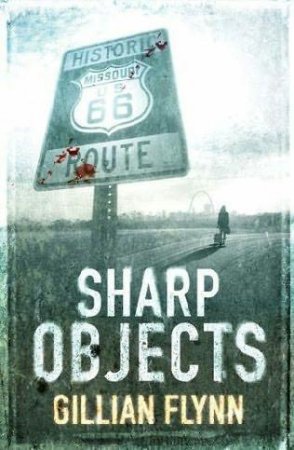 Sharp Objects
Sharp Objects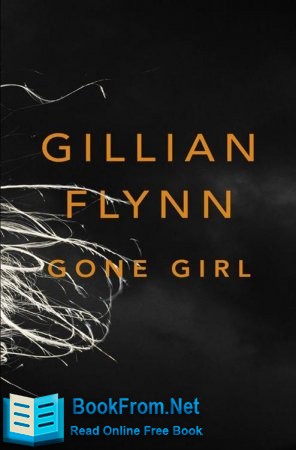 Gone Girl
Gone Girl Dark Places
Dark Places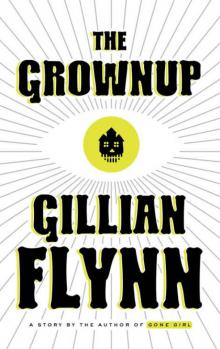 The Grownup
The Grownup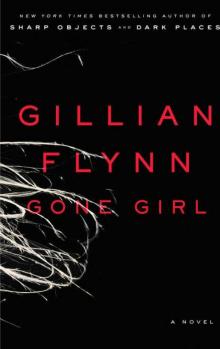 Gone Girl: A Novel
Gone Girl: A Novel The Complete Gillian Flynn
The Complete Gillian Flynn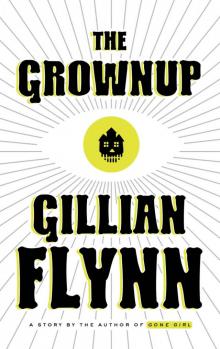 The Grownup: A Story by the Author of Gone Girl (Kindle Single)
The Grownup: A Story by the Author of Gone Girl (Kindle Single)